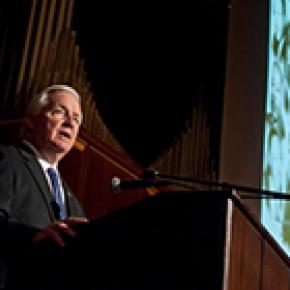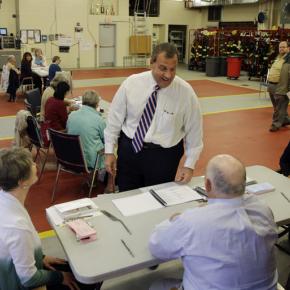Charter School Fraud Has Cost Pennsylvania at Least $30 Million
Daily Kos - October 2, 2014, by Laura Clawson - Pennsylvania's charter schools are rife with fraud and mismanagement, as anyone who reads local newspapers knows. But a new report from the Center...
Daily Kos - October 2, 2014, by Laura Clawson - Pennsylvania's charter schools are rife with fraud and mismanagement, as anyone who reads local newspapers knows. But a new report from the Center for Popular Democracy, "Integrity in Education, and Action United" details just how big the problem is. Pennsylvania charter school enrollment and funding is growing rapidly and without adequate oversight, and according to the report, there's been at least $30 million in fraud by charter school officials since 1997. For instance:
In 2012, the former CEO and founder of the New Media Technology Charter School in Philadelphia was sentenced to prison for stealing $522,000 in taxpayer money to prop up a restaurant, a health food store, and a private school. Media coverage of parent complaints of fiscal wrongdoing initially uncovered the fraud. Nicholas Tombetta, founder of the Pennsylvania Cyber Charter School, has been indicted for diverting $8 million of school funds for houses, a Florida condominium, and an airplane. In 2005, a former business associate of Tombetta surfaced allegations of fraud, which led to the investigation. Dorothy June Brown, founder of Laboratory, Ad Prima, Planet Abacus, and Agora Cyber charter schools, will be retried this year for allegedly defrauding the schools of $6.5 million and conspiring to conceal the fraud from 2007 to 2011. Two administrators plead guilty and testified against Brown in her first trial. In 2009, the Pennsylvania Department of Education conducted an audit of Agora after receiving complaints from parents of Agora students.You'll notice that in each of those cases, it was complaints from parents or a tip from a business associate that led to investigations. Pennsylvania should be doing more to uncover wrongdoing before it's so blatant that parents are screaming about it. In Philadelphia, there are 86 charter schools and only two auditors. What's more, charter school auditors in Pennsylvania don't actively look for fraud; the report calls for expanded local audit authority, fraud risk assessments for all charter schools in the state, and targeted fraud audits. The report's authors also call for a moratorium on new charter schools until these oversight goals are met.
Source
Black Lives Matter Releases Policy Demands, Includes Reparations And Abolishing The Death Penalty
On Monday, more than 60 organizations associated with the Black Lives Matter movement released a series of policy demands, including free access to higher education, reparations, and an end to...
On Monday, more than 60 organizations associated with the Black Lives Matter movement released a series of policy demands, including free access to higher education, reparations, and an end to capital punishment.
According to the New York Times, these demands come on the heels of the second anniversary of Michael Brown’s death and after both the Democratic and Republican National Conventions.
“Our grievances and solutions extend beyond the police killing of our people; state violence includes failing schools that criminalize our children, dwindling earning opportunities, wars on our trans and queer family that deny them of their humanity, and so much more,” Montague Simmons of Organization for Black Struggle and the Movement for Black Lives Policy Table, said in a statement. “That’s why we united, with a renewed energy and purpose, to put forth a shared vision of the world we want to live in.”
The plan, titled “A Vision for Black Lives: Policy Demands for Black Power, Freedom and Justice,” offers up six core demands and 40 policy priorities, NBC News noted. They include:
Ending the War on Black People: This includes abolishing the death penalty, mass surveillance in communities of color, the privatization of police, violence against all Blacks (including Black trans, queer and gender nonconforming people) and using a past criminal history as a means to seek a job, housing, license and voting rights.
Reparations: To address the past and current harms that slavery, Jim Crow, and mass incarceration have done to the Black community, BLM is seeking reparations for the wealth extracted from our communities, guaranteed livable income and free access and open admissions to public community colleges, universities, and technical schools, to name a few.
Invest-Divest: Instead of federal, state, and local monies being invested into prisons, police, surveillance, and exploitative corporations, BLM would rather see that invested into long-term safety strategies such as education, local restorative justice services, employment programs, and universal health care.
Economic Justice: This is calling for Black communities to have real collective ownership of wealth in the U.S. This could be achieved with restructuring tax codes, creating federal and state job programs that specifically target the most economically marginalized Black people, breaking up large banks and ensuring better protection for workers.
Community Control: This would include the end of the privatization of education and making sure communities have the power to hire and fire officers, determine disciplinary action, control budgets and policies, and subpoena relevant agency information when needed.
Political Power: To ensure that real democracy can be achieved for all Black people, BLM wants for all political prisoners to be released, eliminating Super Pacs that fund candidates, ensuring election protection, early registration at the age of 16, full access to technology and the internet, and increased funding to HBCU’s.
Marbre Stahly-Butts, who is part of the leadership team of the Movement for Black Lives Policy Table, told the Times that neither Hillary Clinton or Donald Trump have truly made strides to address these issues in their prospective campaigns.
“On both sides of aisle, the candidates have really failed to address the demands and the concerns of our people. So this was less about this specific political moment and this election, and more about how do we actually start to plant and cultivate the seeds of transformation of this country that go beyond individual candidates,” she said.
This plan also shows a sign of an evolution for the movement, which has been criticized in the past for not having a clear concise platform of how they want to usher in change. And now as the election continues, it’s about using these ideals to further hold the nation’s politicians accountable, Michaela Brown, communications director of Baltimore Bloc, stressed.
“We seek radical transformation, not reactionary reform. As the 2016 election continues, this platform provides us with a way to intervene with an agenda that resists state and corporate power, an opportunity to implement policies that truly value the safety and humanity of black lives, and an overall means to hold elected leaders accountable,” she said in statement.
We hope all these leaders are paying close attention.
By KELLEE TERRELL
Source
'Secure scheduling' rallies focus on giving hourly workers more stability

'Secure scheduling' rallies focus on giving hourly workers more stability
Dive Brief:
New York City Mayor DeBlasio and several advocate groups gathered recently to show support for the introduction of “Fair Workweek” legislation, designed to ensure that 65,000...
Dive Brief:
New York City Mayor DeBlasio and several advocate groups gathered recently to show support for the introduction of “Fair Workweek” legislation, designed to ensure that 65,000 hourly employees in the fast food industry receive fair notification on work hours.
Currently, employers nationwide aren’t required to provide their hourly employees with advance notice of upcoming shifts. As a result, too many families can't budget in advance, plan for education or family care, or secure a necessary second job, according to advocates.
The New York City event echoes the demands of coalition of New York-based advocates who launched a national campaign on Sept. 6. The groups — the Center for Popular Democracy, the Rockefeller Foundation and the online organization Purpose — are asking for scheduling at least two weeks in advance, eliminating on-call assignments that leave employees "scrambling for child care and unable to hold second jobs with uncertain paychecks."
Dive Insight:
Employers do realize that predictability and fairness are reasonable demands, but more often than not, labor cost (and in some cases, labor shortage) creates problems when trying to create better schedules. Frontline managers are expected to create the schedules while also trying to keep costs down, and balancing the two expectations isn't always successful.
What it will take is better workforce planning, with some technology solutions already available to help make that happen, say experts. Also, there are potential negative legal and compliance outcomes for employers who don't follow state and local laws that already require "reporting pay" time be allowed.
By Tom Starner
Source
Charter School Issues Discussed
WBGZ Radio - February 1, 2015, by Dave Dahl - Charter schools in Illinois are in the cross hairs of a new report alleging a lack of accountability leading to between $13 million and $27 million in...
WBGZ Radio - February 1, 2015, by Dave Dahl - Charter schools in Illinois are in the cross hairs of a new report alleging a lack of accountability leading to between $13 million and $27 million in fraud.
“At a time when (Chicago Public Schools are) crying broke, and public schools are grossly under-resourced, and there’s a public demand for transparency and accountability around every corner,” says Action Now executive director Katelyn Johnson, “it seems unconscionable that CPS and the state of Illinois would not invest in rigid financial oversight of charter schools.”
Johnson’s group is supporting the Center for Popular Democracy in the report, “Risking Public Money.”
Andrew Broy has a differing viewpoint. He’s the president of the Illinois Network of Charter Schools and dismisses the other two groups as union-funded and anti-charter to begin with.
“The question” about accountability, he says, “is if there are challenges with an internal governing board, how do we uncover that and make sure it’s taken care of, and the current law equips districts with all the tools they need to make sure that happens.”
Source
City to help immigrants seeking deportation reprieves
New York Times - July 17, 2013, by Kirk Semple - New York City plans to spend $18 million over the next two years to help young unauthorized immigrants qualify for a federal program that grants a...
New York Times - July 17, 2013, by Kirk Semple - New York City plans to spend $18 million over the next two years to help young unauthorized immigrants qualify for a federal program that grants a temporary reprieve from deportation, officials announced on Wednesday.
The money will add 16,000 seats to adult education classes throughout the city, and priority for those slots will be given to immigrants who might qualify for the reprieve.
While more than 20,500 immigrants in New York State have already been granted the reprieve, known as deferred action, city officials have estimated that about 16,000 others in New York City alone would satisfy all the conditions save for the requirement that they have a high school diploma or General Educational Development certificate, or be currently enrolled in school.
The project — the largest investment made by any municipality in the nation to help immigrants obtain the deferral, city officials said — is one of two new immigrant-assistance initiatives that will receive significant injections of public money in the current fiscal year, which began July 1.
The other budget allocation, which the city plans to announce formally on Friday, will pay for a pilot program that will create what immigrants’ advocates say will be the nation’s first public defender system for immigrants facing deportation.
Together, the two programs further cement New York’s reputation as one of the most immigrant-friendly cities in the nation. They also come at a time when a push for comprehensive immigration reform that would include a path to citizenship for unauthorized immigrants has met stiff resistance among Republicans in the House of Representatives.
In a news conference in City Hall on Wednesday, Christine C. Quinn, the City Council speaker, seemed to allude to sclerotic politics on Capitol Hill, saying the Council’s budget decisions send a message to the rest of the nation “that local government can take action while we wait for comprehensive immigration reform.”
The federal deportation reprieve was announced by the Obama administration in June 2012. To qualify, an applicant must have arrived in the United States before reaching his or her 16th birthday and been younger than 31 as of June 15, 2012, among other requirements. Recipients of the reprieve, which is subject to renewal after two years, are legally allowed to work and, in many states, obtain a driver’s license.
More than 400,500 people across the nation have been granted the deferral; for many others, the educational requirement has been a major hurdle.
For years, adult education programs in the city have been swamped by huge demand yet been hamstrung by financial shortfalls.
Of the $18 million allocation, $13.7 million will be provided to community-based organizations through the Youth and Community Development Department and used for outreach and the increase in seats. The remaining $4.3 million will help expand related education programs offered through the City University of New York, like English for Speakers of Other Languages and General Educational Development.
In recent days, immigrants’ advocates have also been celebrating the City Council’s decision to help pay for another initiative: the allocation of $500,000 in its current budget for a network of legal service providers to represent immigrants facing deportation.
Defendants in immigration court, unlike those in criminal court, have no constitutional right to a court-appointed lawyer. Hampered by language barriers, lack of money or ignorance, most end up trying to fight their deportation alone — almost always with poor outcomes.
According to a recent study, 60 percent of detained immigrants in the New York region did not have counsel at the time their cases were completed. Of those without counsel, only 3 percent won their cases, compared with 18 percent of those with counsel.
Proponents of the program, called the New York Immigrant Family Unity Project, said it would cost about $8.7 million to provide legal representation for the 2,800 or so immigrants living in New York State who are detained and face deportation every year. The city allocation, however, will help cover the cost of a pilot program to represent just 135 immigrants. Advocates said that despite its limited reach, the pilot program would give them a chance to test their theories and demonstrate the potential impact of a broader plan.
The program will not only help keep families together, argued Andrew Friedman, executive director of the Center for Popular Democracy, an advocacy group that helped to lobby for the financing, but will also create “an innovative model program” for other municipalities to replicate.
Source
Bill Would Offer State "Citizenship" to Immigrants in New York
Fox News Latino - June 16, 2014, by EFE - A group led by New York state Sen. Gustavo Rivera launched Monday a campaign that proposes awarding state "citizenship" to the estimated 2.7 million...
Fox News Latino - June 16, 2014, by EFE - A group led by New York state Sen. Gustavo Rivera launched Monday a campaign that proposes awarding state "citizenship" to the estimated 2.7 million immigrants who live in the Empire State, regardless of their immigration status.
"We have failed with immigration reform nationally and what we want is to provide an opportunity for the almost 3 million people who live and contribute to the public treasury in our state to take part in its political, civic and economic life," Rivera told Efe Monday before introducing the bill.
Dubbed the New York Is Home Act, the bill contemplates granting citizenship to immigrants who can show they have lived in the state and paid their taxes for the past three years, and who promise to obey state laws, continue paying their taxes and agree to serve on a jury.
Immigrants who fulfill these requisites will receive a new document allowing students to pay in-state tuition and receive financial aid to attend state universities, be eligible for healthcare under Medicaid, obtain a driver's license, have the right to vote in local and state elections and even run for public office.
"We're starting out here in New York but the idea is to extend this movement across the country to other states like California, Illinois and Texas, and to treat our fellow workers, students and store owners as they deserve," Rivera said.
The campaign that kicked off Monday at Manhattan's Battery Park, with the Statue of Liberty in the background, has the backing of political and religious leaders of the region, along with the support of organizations like the Center for Popular Democracy, Make the Road New York and the Benjamin N. Cardozo School of Law.
Source
Escuelas charter en Nueva York requieren mayor escrutinio
Las escuelas independientes (charter) han proliferado en las últimas dos décadas con repetidas promesas de mejorar la calidad de la educación. Su ascenso ha sido tan rápido que hoy en día, el...
Las escuelas independientes (charter) han proliferado en las últimas dos décadas con repetidas promesas de mejorar la calidad de la educación. Su ascenso ha sido tan rápido que hoy en día, el número de alumnos matriculados en muchas escuelas públicas está disminuyendo vertiginosamente, y se tiene previsto que en la próxima década algunos distritos pierdan hasta un tercio de sus estudiantes con relación a principios de siglo. Muchos distritos afectados por esta tendencia se están viendo forzados a despedir maestros, enfermeros y otro personal importante que apoya a los alumnos que quedan en las escuelas públicas.
La ley federal Every Student Succeeds, promulgada a fines del año pasado, no hará sino acelerar esta tendencia. Se proyecta que la ley aumentará al doble el gasto en escuelas charter durante la próxima década.
Sin embargo, a pesar de la explosión en ese sector, la supervisión se ha quedado atrás y, hoy en día, hay cada vez más motivos de preocupación. En un estado tras otro, las investigaciones han revelado mala administración, abusos y fraude descarado en las escuelas charter, incluso en aquellas elogiadas por sus buenos resultados. Una encuesta reciente de escuelas charter en todo el país realizada por el Center for Popular Democracy, descubrió que han despilfarrado la asombrosa cantidad de $216 millones desde 1994.
La ciudad de Nueva York no ha sido inmune al problema. En la extensa red de KIPP, por ejemplo, la escuela pagó casi $70,000 para llevar al personal en viajes de varios días al Caribe para fines presuntamente educativos, pero se detectaron pocas actividades de desarrollo profesional durante la estadía, según descubrió una auditoría en el año 2006.
En 2010, Joel Klein, secretario del Departamento de Educación, ordenó que la East New York Preparatory Charter School cerrara sus puertas después de que se reveló que la fundadora y directora de la escuela se había nombrado superintendente y se había dado un aumento de $60,000.
Muchas otras escuelas charter en toda la ciudad enfrentan preguntas sobre gastos cuestionables. El informe del CPD descubrió que muchas escuelas en la ciudad no documentaban sus gastos, no divulgaban casos de conflicto de intereses ni usaban licitaciones competitivas para asegurarse de comprar productos y servicios al mejor precio.
No se puede permitir que continúe esta situación, particularmente porque se tiene previsto que las escuelas charter aumenten exponencialmente en años próximos. El informe del CPD recomienda varias maneras de asegurar que los gastos de dichas escuelas se mantengan en regla, lo que incluye auditorías para detectar y evitar el fraude, y mecanismos para aumentar la transparencia de quienes operan escuelas charter.
Los encargados de dictar la política deben redoblar sus esfuerzos para promulgar medidas de supervisión incluso más estrictas y asegurar que todas las escuelas charter gasten su dinero sensatamente. A no ser que vigilemos este sector más estrechamente, en años próximos podrían desaparecer millones, perjudicando así a estudiantes y padres de familia en toda la ciudad.
By Kyle Serrette
Source
Which States Could Adopt Automatic Voter Registration Next?
If Americans needed any further proof that voting itself has become a partisan battleground, look no further than proposals calling for automatic voter registration.
California this month...
If Americans needed any further proof that voting itself has become a partisan battleground, look no further than proposals calling for automatic voter registration.
California this month enacted a law that will automatically register people to vote when they get or renew a driver's license or state identification card from the Department of Motor Vehicles (DMV), following the example set by Oregon several months ago. Over time, this could bring most of the 6.6 million Californians who are eligible but not yet registered onto the voting rolls. Alex Padilla, California's secretary of state and sponsor of the measure, calls it potentially the largest voter registration drive in U.S. history.
Other states could soon follow.
Legislators have introduced automatic voter registration bills in 16 additional states, including Hawaii, Illinois and Vermont, as well as the District of Columbia. New Jersey lawmakers approved a package that includes automatic voter registration in June. Republican Gov. Chris Christie hasn't acted on it, but he's made his opposition clear.
"The current process creates an unnecessary barrier for citizens to exercise their fundamental right to vote," said state Sen. Andy Manar, a sponsor of the Illinois measure. "And it's an inefficient use of taxpayer dollars."
The states where bills have seen real movement, however, are all blue states. In states where Republicans control the legislature -- including Georgia, South Carolina and Texas -- measures have mostly languished in committee.
Supporters argue that the real reason for Republican opposition is the party's worry that automatic registration would boost the number of poor and young voters -- groups that favor Democrats. But Republicans complain that automatically registering people to vote based on their DMV status will result in more fraud because, for example, teens still too young to vote and undocumented immigrants get driver's licenses.
In New Jersey, more than 85 percent of eligible citizens are already registered to vote. During a radio appearance in June, Gov. Christie said that, "there's no question in my mind that there are some advocates of this who are looking to increase the opportunities for voter fraud. That's not democracy either."
Studies have shown, however, that voter fraud seldom happens. Proponents of automatic voter registration say that governments have a responsibility to ensure eligible citizens have the opportunity to exercise the franchise, without unnecessary hurdles.
Supporters of the idea are currently collecting signatures in Alaska to put it on the ballot next year. If Christie ultimately vetoes the New Jersey package, a ballot measure may be likely there as well.
"It's not just an election modernization reform, it's a shifting of responsibilty for who populates the rolls," said Katrina Gamble, director of civic engagement and politics at the Center for Popular Democracy. "Even before Oregon, people saw automatic voter registration as the most tranformative reform that we can move that would bring a huge number of people onto the rolls."
Huge numbers of eligible citizens aren't registered to vote. In addition to the nearly 7 million Californians, there are 2.3 million such people in Illinois and there were 300,000 in Oregon.
"If you look across the country, there are at least 50 million people who are eligible but not registered to vote," said Jonathan Brater, counsel for the democracy program at NYU's Brennan Center for Justice. "We see year after year that registration is one of the biggest obstacles to participation."
Other states might explore other models, like using agencies other than the DMV to find potential voters. If the Alaska initiative passes next year, the state will find potential voters through its Permanent Fund, which pays dividends to residents based on oil revenues.
Regardless of the database that's used, automatic registration has the potential to be more accurate than the current approach, which in many places still means relying on paper forms. It should also save money. When Barack Obama was elected president in 2008, only Arizona and Washington offered online registration. Earlier this month, Vermont became the 26th state to allow voters to register online. Going paper-free saves states at least 50 cents on every registration.
It's in part for that reason that Republican legislators in states including Florida, Georgia and Oklahoma have supported online registration. Supporters of automatic voter registration hope that promises of savings might bring GOP lawmakers around to supporting things like registration through the DMV, too.
So far, that's not happening.
In fact, the way that high-profile Democrats running for president have embraced the idea seems to be driving Republicans away. U.S. Sen. Bernie Sanders of Vermont introduced an automatic voter registration bill in Congress, and Hillary Clinton supported the idea during a speech earlier this year in which she castigated the GOP for trying to "disempower and disenfranchise young people, poor people, people with disabilities and people of color," through voter ID requirements and attacks on early voting.
Clinton's speech, according to polling, cost automatic voter registration support among Republican voters. A majority of Republicans (53 percent) supported the idea when Oregon passed its law in March, but after Clinton gave her speech in June, GOP support dropped to 38 percent. When survey respondents were told Clinton backed the idea, their support plummeted further, to 28 percent.
Source: Governing
Father with ALS asks Sen. Jeff Flake on flight to oppose tax bill

Father with ALS asks Sen. Jeff Flake on flight to oppose tax bill
An activist who suffers from ALS protesting the GOP tax cuts confronted Sen. Jeff Flake (R-Ariz.) over his support for the controversial proposal and asked him to change his mind.
“Why not...
An activist who suffers from ALS protesting the GOP tax cuts confronted Sen. Jeff Flake (R-Ariz.) over his support for the controversial proposal and asked him to change his mind.
“Why not take your stand now?” Ady Barkan asked Flake as they waited for their Thursday night flight to depart Washington, D.C. “You can be an American hero. You really could — if the votes match the speech.”
Read the full article here.
Fed's Williams vows more transparency after meeting with Fed Up
San Francisco Fed President John Williams has promised more transparency after a rare meeting with a coalition of community and labor groups which also urged the U.S. central banker to keep...
San Francisco Fed President John Williams has promised more transparency after a rare meeting with a coalition of community and labor groups which also urged the U.S. central banker to keep interest rates low.
Williams largely dismissed their call to hold off on interest-rate hikes, repeating his mantra that monetary policy will depend on economic data. But he said the meeting earlier this week pushed him to "think a little more proactively" about how the Fed recruits and promotes top management.
"I want the Fed to be more transparent," Williams said in an interview. "We've learned along the way that this process of selecting presidents and other aspects of the Fed are not that clear to the public. We should make it more open."
While the San Francisco Fed is not searching for a president or first vice-president, "we want to make sure not only are we doing it right, but also in the future maybe to move the ball forward even further," he said.
He noted that the Minneapolis Fed's openness about its ongoing presidential search is one example to learn from.
The Fed's perceived opaqueness has drawn increasing fire in recent months, with Fed Chair Janet Yellen in testimony this week standing her ground against Congressional efforts to subject the Fed to more oversight. Regional Fed banks' executive searches are also under scrutiny for apparent insularity.
Williams said the meeting also reminded him that despite strengthening overall economic growth, there are "a significant number of people who are left behind and struggling."
One example is Ebony Isler, who ran a hairdressing business until recession-hit clients could not afford her services.
Now, as a part-time cashier at the San Francisco Giants' downtown ballpark, she relies on high-interest loans to bridge her paydays.
"I can't find a job that pays me enough to be self-sufficient," Isler said in an interview after she and a dozen other members of the non-profit group Fed Up met with Williams on Monday.
The group, which first grabbed national attention last summer when it crashed the Kansas City Fed's annual central bankers' meeting in Jackson Hole Wyoming, presented Williams a report arguing that as long as inflation and wage growth remains dull, the Fed should keep rates near zero. (/news/mind-gap-how-federal-reserve-can-help-raise-wages-america-s-women-and-men)
Williams regularly meets with bankers and chief executives.
Meeting with activists, he said, "helps you to think concretely about why are people out of the labor force, what are the problems they are facing."
The group has also sat down with Yellen, Kansas City Fed President Esther George and Boston Fed chief Eric Rosengren.
Source: CNBC













2 months ago
2 months ago